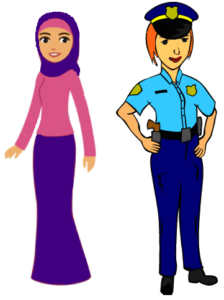
Can volunteering repair a nation? I don’t mean dealing with infrastructure after a war or natural disaster – we know that volunteers are terrific at repairing homes, clearing roads, helping at shelters, rowing boats, etc. I mean can volunteerism be an effective tool when a nation’s people are so divided that they don’t even see reality the same way?
Maybe.
I confess that I am not one for talking about volunteering as a way to access “warm fuzzies” – for optimistic, hopeful moments of restoration of faith in all humanity. Personally, I’m a skeptic at best and a cynic at worst. But I do believe in volunteer engagement as an amazing tool: to build awareness about an issue among a group or population, to give the community a hands-on experience regarding a cause, to educate a group about the realities of a topic, to build understanding among people who may not know much about each other, or might even be hostile, and maybe, just maybe, to restore faith in institutions and other people.
A lot of politicians are talking about coming together and unity among people in the USA, but, as we all are fully aware, that’s going to take more than just talking about it. It’s also only a matter of time before some of those same people start suggesting volunteerism as a salve to heal the nation’s wounds and “unify” the people. They are picturing people of different political parties working side-by-side to clean up trash or paint over graffiti or build something.
But here is what’s going to be missing from that call-to-volunteer-and-let’s-come-together rhetoric, and what it’s going to take for volunteer engagement to lead to bridge-building among people who are oh-so-polarized:
- Nonprofits expected to involve volunteers, especially MORE volunteers, need MONEY. Why? Because volunteers are never free. Want nonprofits to create more roles and tasks for more volunteers? Give those nonprofits cash: for staff to supervise and support volunteers, for staff training in effective volunteer engagement, and for all of the snazzy tech tools you want nonprofits to use to engage with volunteers. And that’s just to start: these nonprofits will also need training in recruiting for diversity, in conflict management, regarding effective facilitation, in inclusive volunteer engagement and communication, and more if you want them to fulfill your dreams of unity – and that requires skills they may not have, and to get those skills requires classes and consultants and that costs money.
- Ready to fund childcare? Because if you want more people to volunteer, and you want a greater diversity of people to volunteer, someone is going to have to pay for childcare for volunteers with children.
- Government has to bring nonprofits to the table for discussions about how to bring disparate groups of people together. If the mayor is having a council on ways to create reconciliation among a diverse city, local nonprofits need to be in the discussions. If a regional or state government body is exploring methods, nonprofits have to be there – not just the big, major nonprofits but the small grassroots groups too. And a key segment that has to be there in discussions: ARTS GROUPS: theater, dance, music, literature and fine arts.
- We all have to stop talking about volunteering only as a way to get tasks done. We have to talk about volunteering as a way for all participants – volunteers, employees and clients – to have a transformational experience. And that means that, often, involving volunteers means tasks will not be done as efficiently and economically as possible: it’s much easier to hire one person or involve one highly-skilled volunteer to do a task than to create a way for a group of dissimilar people with a range of skills and experiences to do it at a time when everyone in that group might be available. It also means making volunteering about learning about an issue related to the mission of the organization – climate change, the reasons people are homeless, the challenges faced by under-employed people, etc. – again, not just getting work done, and not all people charged with creating volunteering tasks and roles and managing volunteers have the skillset to do that.
- Accept that some people aren’t going to be engaged as volunteers because of a requirement at many nonprofits and community groups regarding respect and conduct of employees, consultants and volunteers, because of requirements regarding safety, and because of the potential of volunteers to spread misinformation about the focus of the nonprofit or the cause it addresses. For instance, someone who believes and promotes misinformation about child trafficking on their social media is going to be inappropriate to help at organizations related to children. Someone who does not believe in the safety of vaccines or believes the Earth is flat or refutes other science, and let’s that be known, is going to probably be inappropriate in a range of volunteering roles related to human health, marine health, outdoor geological sites, etc., especially if they will interact with other volunteers or the public. Many nonprofits have a stated commitment to creating a work culture that promotes respect and prohibits words or actions that create a hostile work environment for others. Many nonprofits have a stated commitment to equality and inclusion, and a stated refutation of racism, sexism or hate speech, and a volunteer or employee engaging in actions or language outside of their work that is in contrast to that culture could, as a result upon discovery, be dismissed. Nonprofits should not be pressured to involve volunteers who engage in misinformation that would harm the clients a nonprofit works with or that runs counter to the mission of the organization. Nonprofits should not be pressured to engage volunteers who carry weapons if that nonprofit has a policy that prevents weapons from their workspaces. And all of that means some people are going to be excluded from volunteer engagement at some organizations. Before you decide that’s somehow wrong, that everyone should have a right to volunteer anywhere they want to, note that I myself am excluded from volunteering at some organizations because I cannot adhere to their religious belief requirements, and I accept that.
- It’s a tall order to ask organizations focused on some aspect of the environment and outdoor spaces – wildlife habitat preservation, restoring wetlands, cleaning up trash at the beach, rescue groups, etc. – to engage in additional activities to counter misinformation among volunteers regarding climate change, but that’s exactly what nonprofits need to be funded and empowered to do if we are going for “unity.” The lack of science literacy is resulting in many of the divisions in the USA, and if governments and corporations desire nonprofits to address science misinformation and lack of trust through volunteerism, they need to be prepared to fund the activities needed to train staff to make that happen, and to give staff the time to make that happen. .
So, governments and corporations: are you ready to invite nonprofits to the table, as well as to fund all that’s necessary for this monumental task of unity?
Also, see:
- Creating One-Time, Short-Term Group Volunteering Activities
- Make All Volunteering as Accessible as Possible
- Screening Volunteers for Attitude
- Recruiting Local Volunteers To Increase Diversity Among the Ranks
- Recruiting Volunteers To Serve in Difficult, Even Dangerous Roles
- Make volunteering transformative, not about # of hours
- Nope, volunteering is not always inherently “good”
- Volunteering, by itself, isn’t enough to save the world
- Charity isn’t enough
- More than helping: wanting to make a difference
- Reconciliation
- Using social media to promote respect, tolerance, reconciliation?
- Your right to turn away volunteers who wont adhere to safety measures

If you have benefited from this blog or other parts of my web site or my YouTube videos and would like to support the time that went into researching information, developing material, preparing articles, updating pages, etc. (I receive no funding for this work), here is how you can help.



